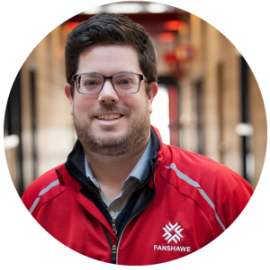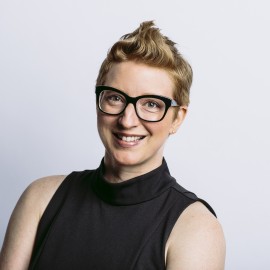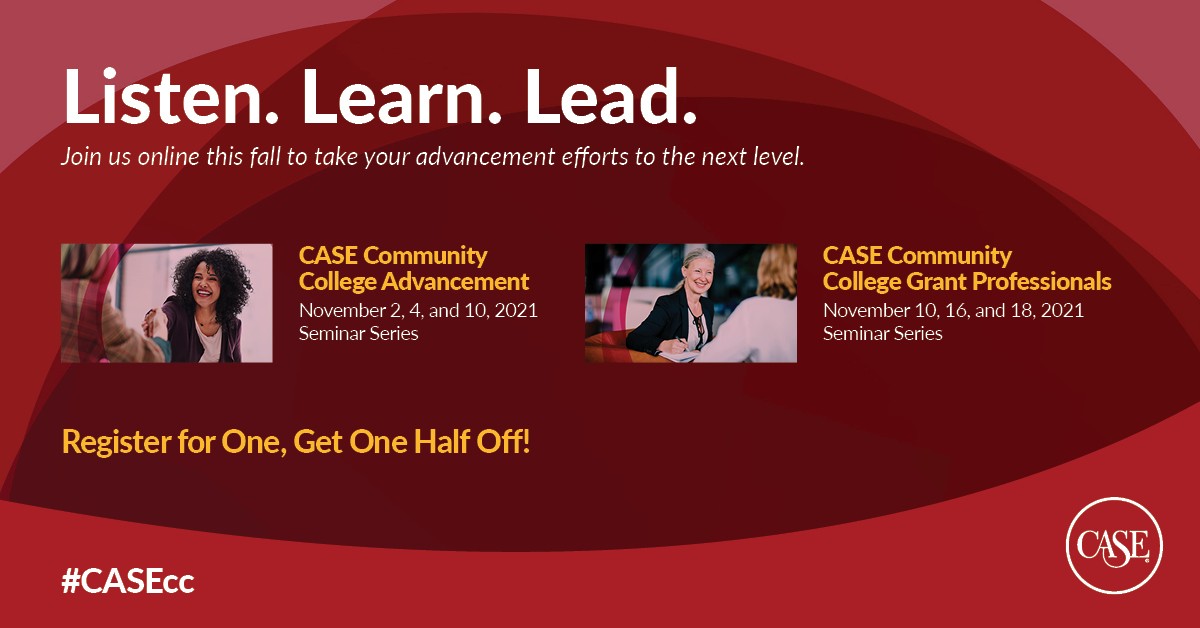The Advancement Angle: Conversation with the Chairs
Dual program, dual chairs.
This year’s seminar series features a crossover event that will bring both the Community College Grant Professional Conference and Community College Advancement Conference together for networking and sessions. Professionals with a foot in each world won’t have to choose between the two conferences, but will get a flavor of important and unique topics that impact everyone.
As we gear up for this November’s programming, I spoke with the chairs of the planning committees on their paths to advancement and what they’re most looking forward to with the seminar series.
Tim Ambrose, alumni relations manager at Fanshawe College, Ontario, Canada, chair of the Seminar Series for Community College Advancement
Emily Cash, grants and donor relations manager at Bismarck State College, North Dakota, U.S., chair of the Seminar Series for Community College Grant Professionals
Who are our chairs, and how did they get to their current roles?
Tim Ambrose: My career path has been interesting to say the least. My first role was in the private sector in sales and marketing with a large faucet manufacturer. From there, I returned to my postsecondary roots at a large 4-year university in Ontario in several roles, including with their student union, in housing, and in community outreach. When I had the opportunity to move to Fanshawe College, my alma mater, and work in the alumni field, I leapt. That was nine years ago. Now, as manager of alumni relations, I spend my days connecting with graduates, sharing their stories of success, and helping them find meaningful ways to reconnect with the college.
It's all about the people for me, both those that I work with on a daily basis as well as those that I get to meet through my role. Our graduates are so interesting. They have often achieved great things in their careers, yet they remain humbled and, in many cases, surprised that the institution would be interested in them and what they're doing. I find their humility, energy, and perspectives inspiring.
Emily Cash: As in all good career moves, I stumbled into my current role after taking an enjoyable and winding path. Mine started with the United States Peace Corps, then to the private sector at an energy company doing education, corporate philanthropy, and event planning, and then into the community college world serving several years as project director for large federal grant programs. After my grant projects came to a close, I was fortunate to transition to my current role as grants and donor relations manager, thanks to my years of experience with communications and project management, as well as an excellent mentor who helped me develop my strengths along the way. I give much credit for this great career path to my volunteer experience in the Peace Corps, which provided me with the foundation to always be ready for an adventure, expect the unexpected, and find common ground with everyone I meet.
In my role at the college, I write grants, handle compliance, and manage our grants portfolio, all of which allow me to work with many departments across campus on a variety of projects. It’s allowed me to dabble in all sorts of areas: strategic planning, academic programs, operations, student services, the list goes on and on and every day is different. It’s a great view from my vantage point—taking an idea from an “I wish” meeting to pen and paper, to the joy of successful funding, through grant startup to closeout, and finally to see that my efforts help our college work towards its mission of student success.

The opportunity to connect with and learn from like-minded colleagues is more valuable now than ever before. This seminar series provides the opportunity to learn from the expertise of others and find new ways to be successful in our day-to-day roles. Additionally, it will provide pathways for connection between colleagues that have the potential for even greater impact down the road.
As you look forward to your respective programs this fall, what excites you about working with your planning committee?
TA: When I look at the committee that's been assembled, I feel so lucky to be a part of it. The connections that I'll be able to create and the learning opportunities that will come from my involvement with this organizing committee will be tremendous to say the least.
EC: The planning committee is my chance to be with those who really “get” the grant world and the type of work that we do. No matter our differences in career path, school size, geographic location, there are stories to be swapped, ideas to be shared, and laughter to be had. I am very fortunate to network with and be among this group of amazingly talented professionals.

My hope is that participants will come away from this seminar series with two things. First, that they receive tools and resources that are practical and impact the daily grind for the better. And second, I hope our participants will take the opportunity to build up their community.
And how about the programs themselves? What are you most looking forward to?
TA: I think we've all had a tough past year and a half. The world has changed, there is no doubt, and our field is no different. The opportunity to connect with and learn from like-minded colleagues is more valuable now than ever before. This seminar series provides the opportunity to learn from the expertise of others and find new ways to be successful in our day-to-day roles. Additionally, it will provide pathways for connection between colleagues that have the potential for even greater impact down the road. I'm excited to really dig into the seminar series and learn everything I can.
EC: Any of my colleagues could attest to the fact that the world of grants has been astoundingly hectic this past year. It’s been full of incredible opportunity, but it has carried on at a frenzied pace. That makes the seminar series this fall a prime time to disconnect from the everyday work at the office for a few hours, network with your colleagues, and spend some time on our own professional growth.
What do you hope participants will take away from the seminar series?
TA: I hope that participants take away practical knowledge and data that helps them add or improve their programs and best practices at their institution. And I hope they establish connections with colleagues that will continue beyond the seminar series. Adding new contacts to one's professional network is one of the many benefits of attending a CASE conference.
EC: My hope is that participants will come away from this seminar series with two things. First, that they receive tools and resources that are practical and impact the daily grind for the better. And second, I hope our participants will take the opportunity to build up their community. Our college grants community is overflowing with kindness and generosity, and we all want to see each other succeed. In a world that’s go, go, go, recharging our batteries with those that offer their support and lift each other up are things that we all need right now.

Buy One, Get One Half Off
Register for the Community College Advancement Seminar Series and take advantage of half off registration for the Community College Grant Professionals Seminar Series at check out.
Don’t miss this opportunity to participate in two additional seminar days on Nov. 16 and 18, 2021, and learn about the work of community college grant professionals.
About the author(s)
For more information about CASE's community college resources, contact Marc Westenburg, director, foundations and community colleges, at mwestenburg@case.org or +1 202-478-5570.

